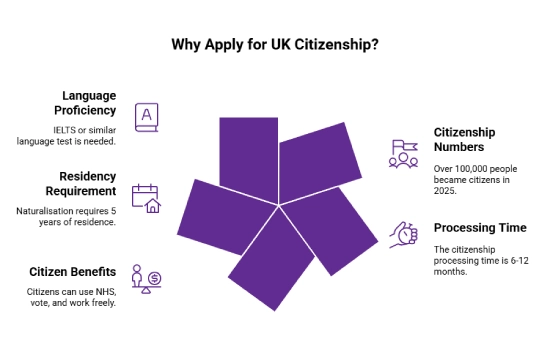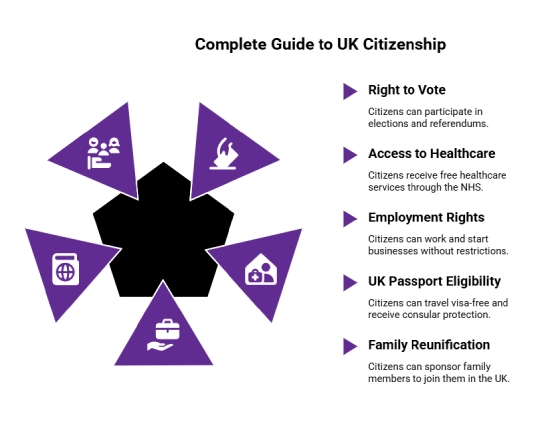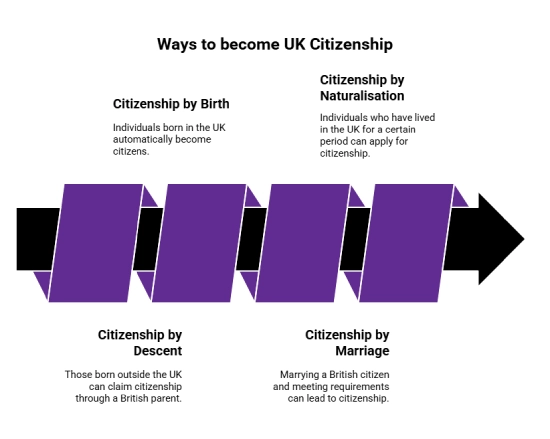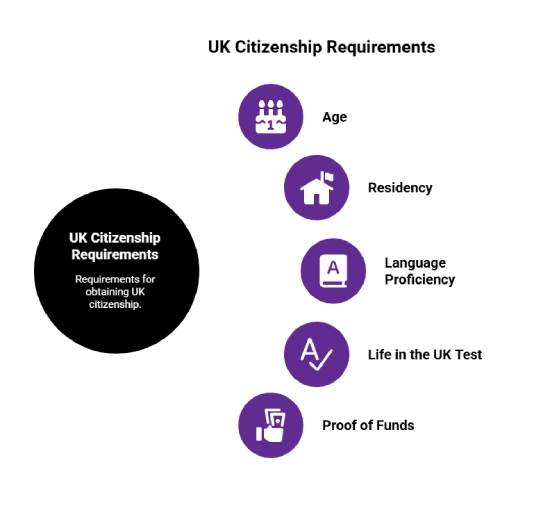Becoming a British citizen offers significant rights and privileges, including the ability to live and work in the UK without restrictions. Whether you're looking for permanent residency or wish to enjoy the benefits of a UK passport, obtaining UK citizenship can provide a sense of security and belonging. With an easy-to-understand application process and clear criteria, applying for UK citizenship opens doors to numerous opportunities.

Obtaining UK citizenship is the final step toward becoming a full member of British society, offering numerous rights and privileges. Whether you are applying through naturalization, birth, or descent, understanding the process and eligibility requirements is crucial.
This comprehensive guide will walk you through each aspect of acquiring British citizenship, from the initial eligibility check to submitting your application, ensuring you have all the information you need for a smooth journey.
UK citizenship grants you the legal status of a British national, which comes with a wide range of rights and privileges. As a British citizen, you gain full access to the rights and benefits provided by the UK government, including:

There are several pathways through which individuals can obtain UK citizenship. The process depends on factors such as birth, descent, naturalization, or marriage.
Below are the primary types of UK citizenship:
Each of these pathways offers a different route to becoming a British citizen, with specific requirements that must be met for eligibility.

*Want to migrate to UK? Talk to Y-Axis for complete guidance.
To be eligible for UK citizenship by naturalization, applicants generally must meet the following criteria:
The requirements for UK citizenship include the following:

Applying for UK citizenship through naturalization involves several important steps. Below is a clear, step-by-step guide to help you navigate the process:
Step 1: Ensure Eligibility
Before applying, make sure you meet all the eligibility criteria for naturalization. This includes the following requirements:
Step 2: Complete the Application
Once you confirm your eligibility, you will need to complete the application form. This form asks for personal details, residency information, work history, and language proficiency. It’s essential to fill the form accurately to avoid delays. You'll also need to provide details about your family status and citizenship history. You can submit the application online through the Home Office website.
Step 3: Submit Documents
Along with the application form, you will need to submit several documents to support your application:
Step 4: Pay Fees
Step 5: Wait for a Decision
After you submit your application, the Home Office will process it. This typically takes between 6 to 12 months, though it can vary based on your application’s complexity and the volume of applications. During this waiting period, you may be contacted for additional information or clarification, so stay in touch with the Home Office.
Step 6: Attend the Citizenship Ceremony
Once your application is approved, you will be invited to attend a citizenship ceremony. At the ceremony, you will take the Oath of Allegiance and make a pledge to be loyal to the United Kingdom. This marks your formal entry as a British citizen, and you will then be able to apply for a UK passport and enjoy all the rights that come with British citizenship.
Common challenges when applying for UK citizenship include:
The Life in the UK Test is a mandatory part of the citizenship application. It assesses your knowledge of British history, culture, and the political system. The test consists of 24 questions and applicants must score at least 75% to pass. Additionally, applicants must demonstrate English language proficiency, usually through an IELTS exam with a minimum score of CLB 7.
The fees for applying for UK citizenship are as follows:
| Fee Type | Amount |
| Application fee for adults | £1,330 |
| Child application fee | £1,000 |
| Biometric fee | £19.20 |
| Life in the UK Test fee | ~£50 |
| Language test fees | Varies (depending on the test provider) |
Note: These fees are non-refundable, even if your application is rejected. Ensure that you meet all requirements before submitting your application to avoid unnecessary costs.
The processing time for a UK citizenship application typically varies depending on several factors. Here's a general breakdown:
| Application Stage | Processing Time |
| Standard Processing Time | 6 to 12 months |
| Possible Delays | If additional evidence or checks are needed |
| Factors Affecting Processing Time | Completeness of documents, background checks, or additional requests |
Y-Axis can assist you throughout the UK citizenship application process.
Our expert team will:
Explore what Global Citizens have to say about Y-Axis in shaping their future
Canada Work Permit Visa
Deepak Jain provided us with great Y-Axi
Read More...
Canada Work Permit Visa
Varun provided us with great Y-Axis Revi
Read More...
Job Search Services
Our client here has enjoyed all the adva
Read More...
UK citizenship grants an individual legal recognition as a British national, offering a wide range of rights, including the ability to live, work, and reside permanently in the UK. British citizens have full access to public services, such as NHS healthcare, can vote in national elections, and are eligible to apply for a UK passport, which facilitates international travel with visa-free access to many countries. Additionally, UK citizens enjoy the right to sponsor family members for immigration, ensuring that they can bring relatives to live in the UK.
The process of acquiring UK citizenship typically takes between 6 to 12 months. The timeline can vary depending on several factors, such as the volume of applications being processed, the complexity of your case, and whether additional information or background checks are needed. If all documentation is provided correctly and no additional requests are made, the application could be processed more quickly. However, delays may occur if there are any discrepancies or missing information in your application.
The UK citizenship application process typically takes around 6 to 12 months from the moment you submit your application. During this time, the Home Office will review your application, conduct background checks, and verify all the information you’ve provided. If additional evidence or documents are required, this may extend the processing time. The application period includes waiting for an Invitation to Apply (ITA) for naturalisation, as well as any time spent attending the required citizenship ceremony after approval.
Nationality refers to an individual’s legal relationship with a country, typically determined by factors such as birthplace or descent. It indicates membership in a nation, but it doesn’t necessarily imply full political rights. On the other hand, citizenship refers to the full legal status and rights granted by a country, including the right to vote, access to public services, and the ability to hold a passport. In the UK, individuals can have British nationality, but citizenship grants additional rights, such as the ability to participate in elections.
You can apply for UK citizenship if you meet the eligibility criteria, which typically includes having lived in the UK for 5 years (or 3 years if married to a British citizen). You must also meet additional conditions, such as passing the Life in the UK Test, demonstrating English language proficiency, and proving that you are of good character. If you have Indefinite Leave to Remain (ILR) status, you must have held it for at least 12 months before applying for naturalisation unless you are married to a British citizen, in which case the 12-month wait is waived.
After obtaining Indefinite Leave to Remain (ILR), you can apply for UK citizenship once you have held your ILR status for 12 months. However, if you are married to a British citizen, you can apply for citizenship after just 3 years of residency in the UK, provided that you hold ILR and meet other eligibility criteria. It’s important to ensure you fulfill all residency requirements and demonstrate good character before applying for naturalisation.
Yes, it is possible to live in the UK without being a British citizen, provided you have legal residency status. This could include holding Indefinite Leave to Remain (ILR) or being on a visa that permits long-term residence, such as a work visa or student visa. However, non-citizens do not enjoy the same full rights as citizens, such as the right to vote, the ability to apply for a UK passport, or the ease of travel. ILR grants the right to live and work indefinitely, but it does not offer all the privileges of citizenship.
To apply for UK citizenship through naturalisation, you need to meet several requirements, including:
All documents must be submitted correctly, and you should meet these criteria before applying.
UK citizenship can be applied for by individuals who meet specific criteria, such as:
Yes, UK citizenship rules are subject to change, especially in light of Brexit and evolving immigration policies. Recent changes have affected the rights of EU nationals to apply for citizenship, and additional criteria may be introduced in the future. It’s important to stay updated on changes in the Home Office guidelines, as they may impact residency requirements, language proficiency tests, or other aspects of the citizenship application process. Always consult the latest information to ensure your application aligns with current requirements.
UK citizenship grants full legal rights, including the right to live and work in the UK without restrictions, vote in all elections, access public services, and hold a British passport. Citizens are also protected from immigration control. Responsibilities include obeying UK laws, paying taxes, and fulfilling civic duties such as jury service when required.
UK citizenship is the most complete form of British nationality, providing full political and residency rights. Other British nationality types, such as British Overseas Citizen or British National (Overseas), may not grant the automatic right to live or work in the UK. Citizenship uniquely allows voting rights and permanent legal status.
Most applicants can apply for UK citizenship after holding Indefinite Leave to Remain (ILR) for at least 12 months. Spouses of British citizens may apply immediately after receiving ILR, provided all residency and eligibility requirements are met.
Yes, individuals with Indefinite Leave to Remain can live in the UK permanently without applying for citizenship. However, ILR holders remain subject to immigration rules, including possible loss of status after long absences, unlike UK citizens.
Eligibility depends on the route. Standard applicants usually need ILR and long-term UK residence. Spouses of British citizens qualify through marriage or civil partnership. Discretionary routes may apply to refugees, stateless persons, or individuals with exceptional circumstances recognised by the Home Office.
Applicants must meet residence requirements, hold ILR or settled status, demonstrate good character, pass the Life in the UK Test, meet English language requirements, and show lawful residence throughout the qualifying period.